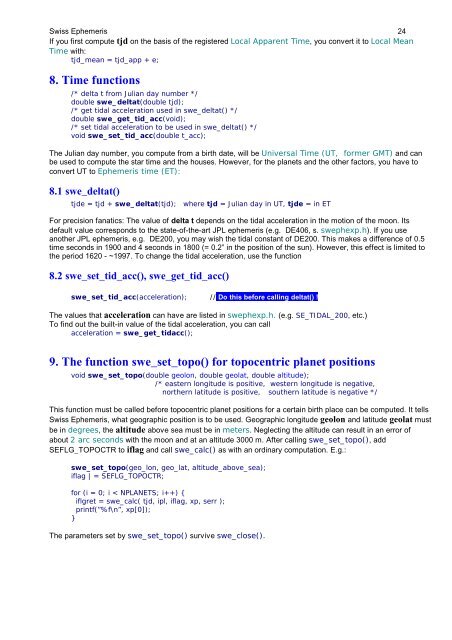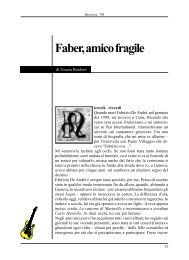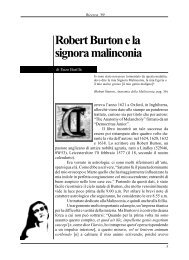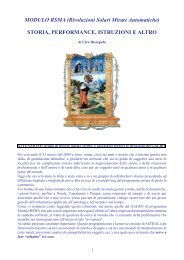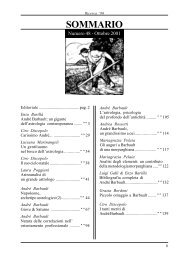Programming interface to the Swiss Ephemeris - programmiastral.com
Programming interface to the Swiss Ephemeris - programmiastral.com
Programming interface to the Swiss Ephemeris - programmiastral.com
You also want an ePaper? Increase the reach of your titles
YUMPU automatically turns print PDFs into web optimized ePapers that Google loves.
<strong>Swiss</strong> <strong>Ephemeris</strong> 24<br />
If you first <strong>com</strong>pute tjd on <strong>the</strong> basis of <strong>the</strong> registered Local Apparent Time, you convert it <strong>to</strong> Local Mean<br />
Time with:<br />
tjd_mean = tjd_app + e;<br />
8. Time functions<br />
/* delta t from Julian day number */<br />
double swe_deltat(double tjd);<br />
/* get tidal acceleration used in swe_deltat() */<br />
double swe_get_tid_acc(void);<br />
/* set tidal acceleration <strong>to</strong> be used in swe_deltat() */<br />
void swe_set_tid_acc(double t_acc);<br />
The Julian day number, you <strong>com</strong>pute from a birth date, will be Universal Time (UT, former GMT) and can<br />
be used <strong>to</strong> <strong>com</strong>pute <strong>the</strong> star time and <strong>the</strong> houses. However, for <strong>the</strong> planets and <strong>the</strong> o<strong>the</strong>r fac<strong>to</strong>rs, you have <strong>to</strong><br />
convert UT <strong>to</strong> <strong>Ephemeris</strong> time (ET):<br />
8.1 swe_deltat()<br />
tjde = tjd + swe_deltat(tjd); where tjd = Julian day in UT, tjde = in ET<br />
For precision fanatics: The value of delta t depends on <strong>the</strong> tidal acceleration in <strong>the</strong> motion of <strong>the</strong> moon. Its<br />
default value corresponds <strong>to</strong> <strong>the</strong> state-of-<strong>the</strong>-art JPL ephemeris (e.g. DE406, s. swephexp.h). If you use<br />
ano<strong>the</strong>r JPL ephemeris, e.g. DE200, you may wish <strong>the</strong> tidal constant of DE200. This makes a difference of 0.5<br />
time seconds in 1900 and 4 seconds in 1800 (= 0.2” in <strong>the</strong> position of <strong>the</strong> sun). However, this effect is limited <strong>to</strong><br />
<strong>the</strong> period 1620 - ~1997. To change <strong>the</strong> tidal acceleration, use <strong>the</strong> function<br />
8.2 swe_set_tid_acc(), swe_get_tid_acc()<br />
swe_set_tid_acc(acceleration); // Do this before calling deltat() !<br />
The values that acceleration can have are listed in swephexp.h. (e.g. SE_TIDAL_200, etc.)<br />
To find out <strong>the</strong> built-in value of <strong>the</strong> tidal acceleration, you can call<br />
acceleration = swe_get_tidacc();<br />
9. The function swe_set_<strong>to</strong>po() for <strong>to</strong>pocentric planet positions<br />
void swe_set_<strong>to</strong>po(double geolon, double geolat, double altitude);<br />
/* eastern longitude is positive, western longitude is negative,<br />
nor<strong>the</strong>rn latitude is positive, sou<strong>the</strong>rn latitude is negative */<br />
This function must be called before <strong>to</strong>pocentric planet positions for a certain birth place can be <strong>com</strong>puted. It tells<br />
<strong>Swiss</strong> <strong>Ephemeris</strong>, what geographic position is <strong>to</strong> be used. Geographic longitude geolon and latitude geolat must<br />
be in degrees, <strong>the</strong> altitude above sea must be in meters. Neglecting <strong>the</strong> altitude can result in an error of<br />
about 2 arc seconds with <strong>the</strong> moon and at an altitude 3000 m. After calling swe_set_<strong>to</strong>po(), add<br />
SEFLG_TOPOCTR <strong>to</strong> iflag and call swe_calc() as with an ordinary <strong>com</strong>putation. E.g.:<br />
swe_set_<strong>to</strong>po(geo_lon, geo_lat, altitude_above_sea);<br />
iflag | = SEFLG_TOPOCTR;<br />
for (i = 0; i < NPLANETS; i++) {<br />
iflgret = swe_calc( tjd, ipl, iflag, xp, serr );<br />
printf(”%f\n”, xp[0]);<br />
}<br />
The parameters set by swe_set_<strong>to</strong>po() survive swe_close().


